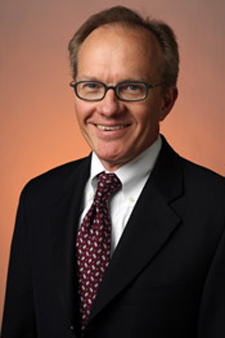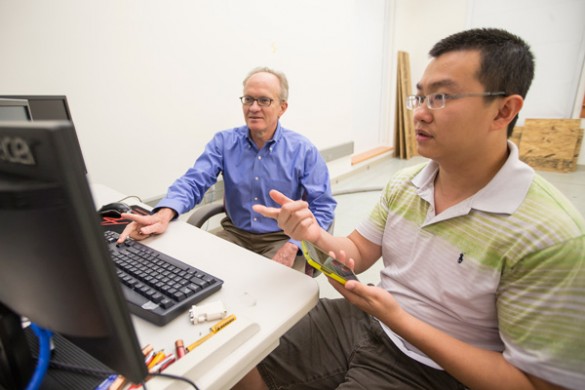Timothy P. McNamara, professor of psychology, will step down as vice provost for research and international affairs Dec. 31, concluding a one-year appointment to the role and more than a decade of service to the Office of the Provost. He plans to return to full-time research and teaching, starting with a leave that will begin Jan. 1, 2016.

“A year ago, Tim graciously took on the new assignment of vice provost for research and international affairs, assuming oversight and leadership of many aspects of the research domain and focusing specifically for the provost’s office on activities related to the Vanderbilt University Medical Center transition,” Provost and Vice Chancellor for Academic Affairs Susan R. Wente said, noting that McNamara has continued to advance Vanderbilt’s global education initiatives during this time.
“Tim’s insights and contributions have been invaluable as we’ve worked together to define the long-term scope of function for a vice provost in these important areas,” Wente said. “I am deeply grateful for his commitment to the university and for helping to advance Vanderbilt’s missions of discovery and global engagement.”
Wente named Padma Raghavan the new vice provost for research on Dec. 10 following a national search. Raghavan will begin Feb. 1, 2016.
Over the past year, McNamara has worked with research leaders at the Medical Center to provide broad oversight of Vanderbilt’s interschool research centers and institutes and of a number of campuswide services. In addition, with his prior extensive experience leading the university’s Office of Faculty Affairs, he was an integral partner with Associate Vice Chancellor for Health Affairs David Raiford in contributing to plans for the VU-VUMC reorganization.
“I’ve been involved in many aspects of the transition, including faculty appointments and promotions, revisions to the Faculty Manual, the research enterprise, educational programs, intellectual property and technology transfer, core research facilities, animal care, and human subjects research. It’s been a very interesting learning process,” McNamara said. “We will end up in a great place, as many of the university responsibilities related to research that previously have been dispersed will be brought together under the overall leadership of the new vice provost for research.”
For example, a new pre-award office for grants and contracts will report to the vice provost for research. Other entities, such as the Animal Care and Use Program and the Human Research Protection Program and Institutional Review Board, will continue to be administered by the Medical Center for all faculty at the university and VUMC. Maintaining open lines of communication with the Medical Center and supporting faculty in university schools that use these services will be a top priority moving forward, McNamara said.
He is confident that Vanderbilt’s spirit of trans-institutional collaboration will remain strong following the transition.
“[lquote]The most important guiding principle as we’ve approached the transition is to do no harm—to do nothing that would inhibit or encumber faculty scholarship and research or damage the culture of collaboration that we’ve worked hard to develop between the university and the Medical Center over the past 15 years,” McNamara said.[/lquote]
“During Tim’s tenure in the Office of the Provost, he has rendered superb service to the entire university community and especially to our faculty,” Raiford, a professor of medicine, said. “It has been a privilege to collaborate and consult over the past decade with him on so many matters affecting Vanderbilt’s faculty. He is a tireless advocate for faculty members, their interests, and their uninhibited pursuit of scholarship.
“I am especially grateful to Tim for our close partnership over the past year in ensuring that faculty issues and concerns have been thoughtfully considered throughout the VU-VUMC reorganization,” Raiford said. “We as a faculty are indebted to Tim for his leadership and vision.”
Prior to his appointment as vice provost for research and international affairs, McNamara served as vice provost for faculty and international affairs since 2011. Before that, he was associate provost for faculty from 2004 to 2009 and vice provost for faculty from 2009 to 2011.
McNamara has overseen the Global Education Office’s expansion in the increased number of students going abroad and the increase in available study-abroad locations and program types, and he created the Faculty Advisory Council on International Education. He also led the creation of Global Support Services, launched in spring 2015 to provide coordinated support for international collaboration and research by Vanderbilt faculty and staff.
“What we have now is an office that’s really proactive in solving problems for faculty and their support staff when they’re doing work overseas,” McNamara said. GSS facilitates employment-related visas for international employees and visitors, provides international tax services for foreign nationals, helps faculty and staff with export control laws and regulations, and monitors international travel safety and security, among other functions.
McNamara has played a key role in Peabody College of education and human development’s successful partnerships in Abu Dhabi, the capital of the United Arab Emirates. Since 2011, Peabody faculty have collaborated with the Abu Dhabi Education Council to create professional development programs for principals and vice principals in the emirate as well as consult on the management of two model schools. Those projects were renewed a year and a half ago, and a third project assisting ADEC with STEM education at the high school level was launched this past summer.
“These efforts have been enormously successful in developing leaders for Abu Dhabi’s schools, and great strides have been made in improving the ability of school leadership to implement curriculum and manage schools effectively,” McNamara said. “Dean Camilla Benbow has been an invaluable and very engaged leader in this process.”
“Tim was instrumental in establishing Vanderbilt’s partnership with Abu Dhabi, where Peabody faculty have been developing and nurturing models for educational improvement. We could not have done it without him,” Benbow, Patricia and Rodes Hart Dean of Education and Human Development, said. “I’ve been grateful for his support for that effort along with other successes he has helped to facilitate.”

As associate and then vice provost for faculty, McNamara worked to empower faculty through career development. Under his leadership, the provost’s office launched a new faculty orientation to introduce newly hired faculty to the university; the first promotion and tenure orientation session for tenure-track faculty; and a faculty development seminar series that features panel discussions on topics related to career development, among other initiatives.
McNamara has served as Vanderbilt’s accreditation liaison to the Southern Association of Colleges and Schools Commission on Colleges, the regional body for the accreditation of degree-granting higher education institutions in the Southern states, and was elected to the SACSCOC Board of Trustees in 2013. He has represented Vanderbilt on the American Association of Universities’ Senior Research Officers group. He has served as Vanderbilt’s representative on the UT-Battelle Board of Governors, which oversees management of Oak Ridge National Laboratory. And he co-chaired Vanderbilt’s Oversight and Compliance Committee on the Protection of Children in 2012.
Colleagues within the provost’s office consider McNamara a trusted adviser, counselor and exceptional university citizen, willing to step in and work on various initiatives as needed under the leadership of three provosts.
“Tim has served many different and important roles in the provost’s office,” Assistant Provost for Faculty and Institutional Accreditation Dawn Turton said. “He has been a strong advocate for faculty throughout his tenure and served as a leader on global issues in his role as vice provost for international affairs.
“I’ve worked with Tim for the last six years, and he has been an incredible mentor and colleague to myself and many others,” Turton continued. “[rquote]He allows the people working for him to grow and develop their careers, providing guidance along the way. He truly cares about the university and those working here.”[/rquote]
A professor of psychology in the College of Arts and Science, McNamara’s research investigates human memory. One line of his research investigates how spatial relations among objects in the environment are represented in memory and how remembered spatial relations are used to guide navigation. A second line of research uses priming paradigms to examine mechanisms of retrieval in semantic and episodic memory.
He joined the Department of Psychology in 1983 and chaired the department from 1996 to 2004. He is a fellow of the American Association for the Advancement of Science, the American Psychological Association and the Association for Psychological Science.
McNamara currently advises one graduate student and in recent years has taught a Commons seminar titled “Stumbling into, and out of, happiness.” Following a sabbatical, he’s eager to return to the classroom and work directly with students.
“The future looks very bright for the university and the provost’s office. Susan Wente has been outstanding in her role as provost over the past year and a half and has put together a very talented, capable team,” McNamara said. “With the leadership of Chancellor Zeppos and Provost Wente, there’s been tremendous progress in implementing the Academic Strategic Plan, which puts the university on track to have even greater impact on the educational experiences of students, the ability of faculty to do their best work, and on society at large.”